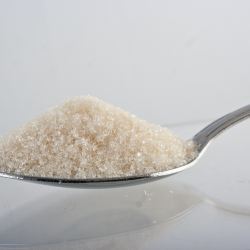The Glucose Goddess is a prominent Instagram health influencer. Her real name is Jessie Inchauspe, and she has a master’s degree in biochemistry. She’s made her fame on social media by preaching about blood sugar and health. She’s the quintessential social media influencer: she sells books, courses, and recipes. Basically, everything except supplements … until now!
Anti-Spike Formula
Inchauspe recently debuted her newest product, a supplement for sale: Anti-Spike Formula. It is currently on pre-order, with shipments slated to begin in April of this year. Anti-Spike is marketed to decrease the natural sugar spike your body experiences after eating. It’s also touted as made with 100% natural ingredients, gut-friendly, sugar-free, vegan, and gluten-free. The Anti-Spike Formula has four-ish ingredients: white mulberry leaf, lemon extract, cinnamon extract, and something called Glucose Goddess Antioxidants - a proprietary blend of vegetable extracts.
According to her website, Anti-Spike is
“Clinically proven to reduce the glucose spike of carbs and sugar by up to 40%.”
This one sentence has a lot to unpack, so let’s dig in.
“…the glucose spike of carbs and sugar….”
It is perfectly normal for your body’s sugar levels to increase immediately after eating. Insulin will be released to help the sugar enter your cells to be used for energy. Some foods release sugars and carbohydrates more quickly – low glycemic index foods. However, the total amount of sugar and carbohydrates absorbed remains the same; absorption takes a bit longer. Inchauspe states
“And glucose spikes make you exhausted, cranky, kick-off sugar addiction, hurt your hormones, your sleep, your skin, and also lead to type 2 diabetes.”
A more careful review of the literature shows that, at best, glycemic spikes were associated with acne, alterations of sleep, and even the onset of type 2 diabetes, but it is not the spike alone, but a diet that is excessively high in sugar and carbohydrates.
“Clinically-proven”
The website references several articles on PubMed, the National Library of Medicine database, for its claims. However, without looking at and reading the individual references, it is easy to come away with a “medical halo,” believing that this supplement has undergone clinically significant randomized controlled trial testing. It has not. All the studies referenced are for individual ingredients, most for white mulberry leaf. In fact, of the 11 articles referenced, seven are for mulberry leaf extract, three are for Eriomin, a proprietary supplement of citrus extract, and one is for cinnamon; none are for the Glucose Goddess Antioxidant blend or the ingredients listed in the blend.
Mulberry Leaf Extract
While studies on mulberry leaf extract have been promising, it’s still far too early to make claims like “clinically proven.” The referenced studies are primarily small studies with variable doses, interventions, and results. For example,
- A study of 30 people demonstrated reduced insulin one hour after eating, but that effect had worn off by the second hour.
- A study included only 12 people in the mulberry leaf extract arm.
- A study involving 36 participants was a bit of a wash, with no difference between the blood glucose of the placebo and mulberry group at the 60 and 90-minute measurements. Or a study involving 37 individuals showing no effects until 30 minutes after ingestion.
- A meta-analysis, the largest referenced, included 12 studies and 615 participants and does seem promising. However, doses and specific interventions that will impact outcomes were inconsistent. Promising is far from definitive or “clinically proven.” Medications are held to a much higher standard than this.
Eriomin
Eriomin is a proprietary blend of “high potency lemon flavonoid.” Of the three articles referenced for Eriomin, one had 103 participants, another had 30 participants, and this final study is not an RCT but a simulation and looked at Eriomin combined with metformin. Like mulberry leaf extract studies, the dosing is not standardized, and the interventions vary. While promising, a sample of 130 people is insufficient to claim that anything is “clinically proven.”
Cinnamon
The study referenced for cinnamon is from 2003, which may make you think it’s the final word on the subject. However, there’s a reason why this sole study is 20 years old. A later Cochrane Review considering cinnamon in treating diabetes concluded,
“No statistically significant difference in glycosylated haemoglobin A1c (HbA1c), serum insulin or postprandial glucose was found between cinnamon and control groups.”
The research into cinnamon has dropped off because its efficacy is not panning out.
Glucose Goddess Antioxidants
No evidence. No studies. No trials. Antioxidants have been a buzzword in the wellness world for seemingly ever. When you’re making your own supplement, it needs to be jam-packed with the loudest of buzzwords and proprietary blends. This is no exception.
Conclusion
This supplement has not been thoroughly studied, and there are no randomized controlled trials, which is the gold standard. While some of its ingredients may have promise, as with other supplements, the dosing, administration, blend, and production matter. Since supplements aren’t regulated, they’re notorious for adulteration with other drugs.
Inchauspe’s constant refrain that she’s science-based is supposed to comfort the consumer. In this case, it seems as though the sheer number of studies is meant to impress because the content of the studies certainly does not fit the claims. She shows “her work,” but her work is not what she claims. It’s just another money-making ploy in the form of a supplement being hawked by an influencer. She uses her credentials to make you think that you need what she’s advertising and that what you’re getting isn’t just another unregulated, untested supplement. Make no mistake, that’s exactly what it is.

